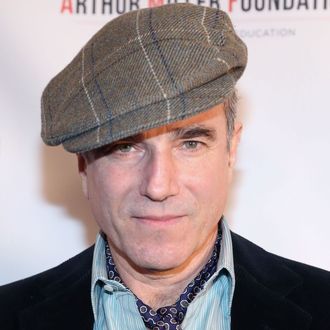
Daniel Day-Lewis is an elusive figure. Even when you see him on screen, you’re never really seeing the man, since he’s so immersed in his roles that he’s actually inhabiting the skin of a different human that just happens to be wearing a Daniel Day-Lewis suit. He also doesn’t like having his photo taken and rarely grants interviews, but W managed to wrangle him for a cover shoot and a chat while he promotes the Paul Thomas Anderson–directed Phantom Thread, which he says is his last film role. For the first time, he discussed his impending retirement. “Before making the film, I didn’t know I was going to stop acting,” Day-Lewis told W. “I do know that Paul and I laughed a lot before we made the movie. And then we stopped laughing because we were both overwhelmed by a sense of sadness. That took us by surprise: We didn’t realize what we had given birth to. It was hard to live with. And still is.”
The three-time Best Actor Oscar winner famously takes long breaks between films, and prepares deeply for every role. To play English dressmaker Reynolds Woodcock for Phantom Thread, Day-Lewis studied footage of mid-century fashion shows, apprenticed for months under the head of the costume department at the New York City Ballet, “meticulously invented every aspect of Woodcock’s personal wardrobe,” as W put it, and fixated on art direction of the designer’s home as well what pens and paper he would use to sketch dresses. Then upon delivering the performance and the film, Day-Lewis hit despair, and while he has toyed with leaving acting in the past, this time he put out a very uncharacteristic public statement to hold himself accountable. He says “the responsibility of a creative life” is both “a curse and a blessing. You can never separate them until the day you die. It’s the thing that feeds you and eats away at you; gives you life and is killing you at the same time.” If that’s how you talk about your job, it makes sense that you’d want to quit.
The actor never gives a tidy reason for why he’s walking away from his celebrated career. He seems to be sure in his bones that it’s time to be done, and as part of his decision to retire he says he has no intention of watching his last performance. “I dread to use the overused word ‘artist,’ but there’s something of the responsibility of the artist that hung over me,” Day-Lewis explained. “I need to believe in the value of what I’m doing. The work can seem vital. Irresistible, even. And if an audience believes it, that should be good enough for me. But, lately, it isn’t.”


